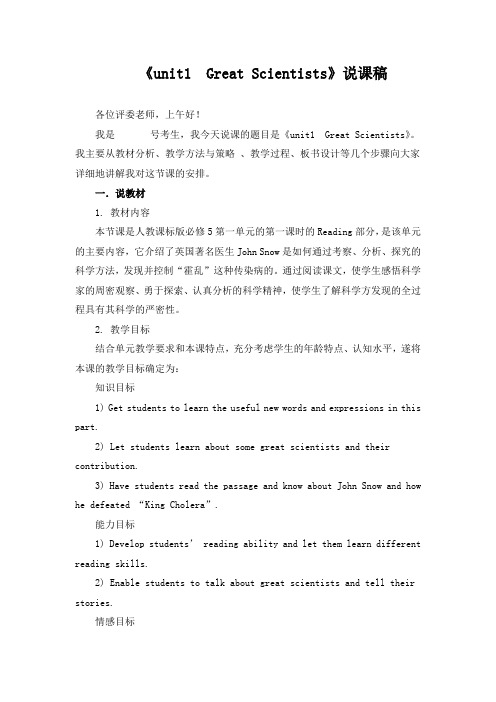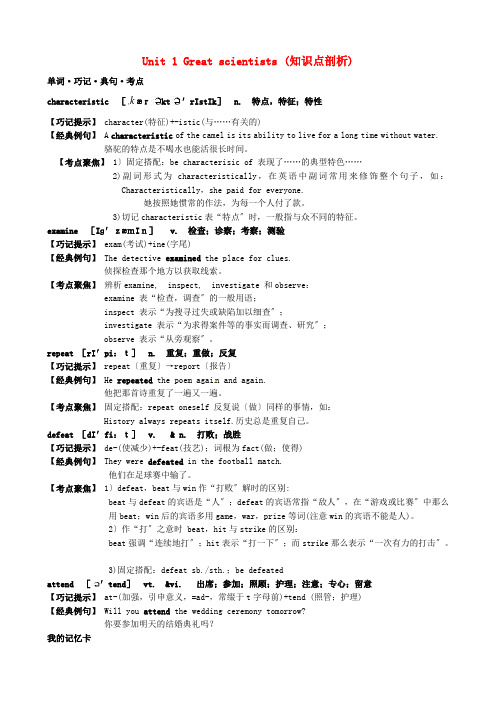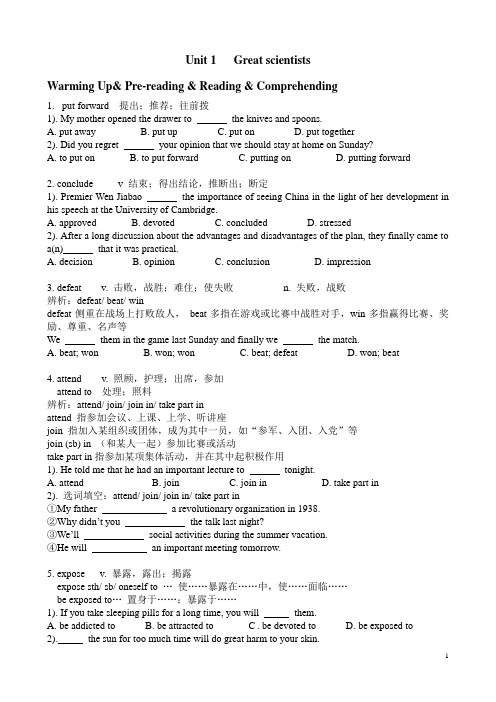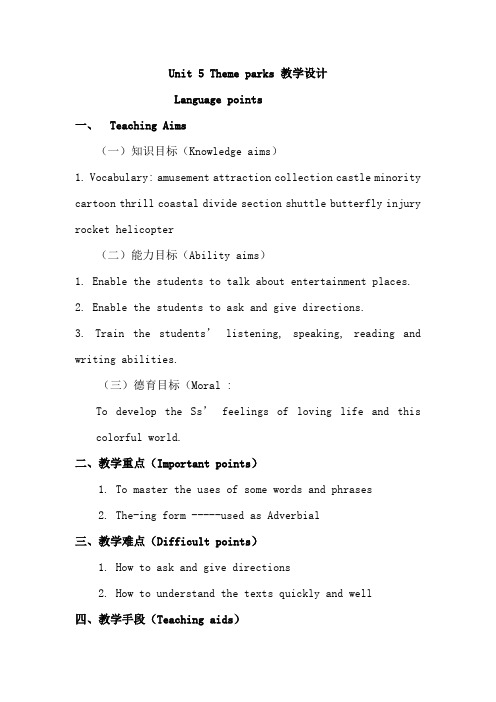Unit.1 Great Scientists重难点详解
- 格式:doc
- 大小:38.00 KB
- 文档页数:3

英语模块5Unit.1 Great Scientists重难点详解一、重点单词用法精解1. characteristic n. 特征,特性The chief characteristic of human being is that they can think. 人类主要的特征是他们会思考。
2. expose vt. 暴露,揭发,曝光(摄影)Don’t expose the baby to the burning sun. 切勿将小孩曝晒。
注:expose sb/sth to…中的to为介词。
3. defeat vt. & n. 击败;战胜;The army defeated the enemy in the end. 军队最终战胜了敌军。
Tom suffered the defeat in the English examination. 汤姆英语考试失败了。
辨析:win的宾语是game, prize等物(不是人);beat和defeat的宾语是人;hit“打一下”;beat “(连续地)打”;strike “重击”。
4. cure vt. & n. 治愈,治疗法There is no known cure for AIDS. 还无治疗艾滋病之法。
It is possible to cure the sickness. 治愈这种疾病还是可能的。
辨析:cure“治愈”,强调结果;treat“治疗”,强调动作过程;说cure sb of sth. 但说treat sb for sth.5. blame vt. 责备,归咎The teacher blamed me for my being late for school again. 老师因我又迟到批评了我。
注:blame sb for sth=blame sth on sb.6. backward adj. & adv. 向后We turn backward(s) then rightward(s). 我们向后转然后向右转。

《unit1 Great Scientists》说课稿各位评委老师,上午好!我是号考生,我今天说课的题目是《unit1 Great Scientists》。
我主要从教材分析、教学方法与策略、教学过程、板书设计等几个步骤向大家详细地讲解我对这节课的安排。
一.说教材1. 教材内容本节课是人教课标版必修5第一单元的第一课时的Reading部分,是该单元的主要内容,它介绍了英国著名医生John Snow是如何通过考察、分析、探究的科学方法,发现并控制“霍乱”这种传染病的。
通过阅读课文,使学生感悟科学家的周密观察、勇于探索、认真分析的科学精神,使学生了解科学方发现的全过程具有其科学的严密性。
2. 教学目标结合单元教学要求和本课特点,充分考虑学生的年龄特点、认知水平,遂将本课的教学目标确定为:知识目标1) Get students to learn the useful new words and expressions in this part.2) Let students learn about some great scientists and their contribution.3) Have students read the passage and know about John Snow and how he defeated “King Cholera”.能力目标1) Develop students’ reading ability and let them learn different reading skills.2) Enable students to talk about great scientists and tell their stories.情感目标1) Let students learn from great scientists, stimulate their love and respect for them and develop their moral qualities.2) Develop student’s sense of cooperative learning.3. 教学重点因为本组教材的重点了解项目是“John Snow 破解King Cholera难题”,所以确定本课的教学重点是:1) Let students learn about some great scientists and their contributions.2) Get students to read the passage and know about John Snow and how he defeated “ King Cholera”.3) Have students learn different reading skills.4.教学难点考虑到学生拓展阅读能力,语言输出能力等方面还需进一步努力,所以将本课的教学难点确定为:1) Develop students’ reading ability.2) Enable students to talk about great scientists and tell their stories.3) Let students learn how to organize scientific research.二.说教法和学法1. 教学方法引导学生独立思考,合作学习,进行师生、生生互动的“任务型”教学,设计了许多易于操作的任务型活动。

Unit 1 Great scientists (知识点剖析)单词·巧记·典句·考点ærkt′rIstIk] n.特点,特征;特性characteristic [k'【巧记提示】 character(特征)+-istic(与……有关的)【经典例句】 A characteristic of the camel is its ability to live for a long time without water.骆驼的特点是不喝水也能活很长时间。
【考点聚焦】 1〕固定搭配:be characterisic of 表现了……的典型特色……2)副词形式为characteristically,在英语中副词常用来修饰整个句子,如:Characteristically,she paid for everyone.她按照她惯常的作法,为每一个人付了款。
3)切记characteristic表“特点〞时,一般指与众不同的特征。
examine [Iɡ′zæmIn] v.检查;诊察;考察;测验【巧记提示】 exam(考试)+ine(字尾)【经典例句】 The detective examined the place for clues.侦探检查那个地方以获取线索。
【考点聚焦】辨析examine, inspect, investigate 和observe:examine 表“检查,调查〞的一般用语;inspect 表示“为搜寻过失或缺陷加以细查〞;investigate 表示“为求得案件等的事实而调查、研究〞;observe 表示“从旁观察〞。
repeat [rI′pi:t]n.重复;重做;反复【巧记提示】 repeat〔重复〕→report〔报告〕【经典例句】 He repeated the poem agai n and again.他把那首诗重复了一遍又一遍。

Unit 1 Great scientistsWarming Up& Pre-reading & Reading & Comprehending1.put forward 提出;推荐;往前拨1). My mother opened the drawer to the knives and spoons.A. put awayB. put upC. put onD. put together2). Did you regret your opinion that we should stay at home on Sunday?A. to put onB. to put forwardC. putting onD. putting forward2. conclude v 结束;得出结论,推断出;断定1). Premier Wen Jiabao the importance of seeing China in the light of her development in his speech at the University of Cambridge.A. approvedB. devotedC. concludedD. stressed2). After a long discussion about the advantages and disadvantages of the plan, they finally came to a(n) that it was practical.A. decisionB. opinionC. conclusionD. impression3. defeat v. 击败,战胜;难住;使失败n. 失败,战败辨析:defeat/ beat/ windefeat侧重在战场上打败敌人,beat多指在游戏或比赛中战胜对手,win多指赢得比赛、奖励、尊重、名声等We them in the game last Sunday and finally we the match.A. beat; wonB. won; wonC. beat; defeatD. won; beat4. attend v. 照顾,护理;出席,参加attend to 处理;照料辨析:attend/ join/ join in/ take part inattend 指参加会议、上课、上学、听讲座join 指加入某组织或团体,成为其中一员,如“参军、入团、入党”等join (sb) in (和某人一起)参加比赛或活动take part in指参加某项集体活动,并在其中起积极作用1). He told me that he had an important lecture to tonight.A. attendB. joinC. join inD. take part in2). 选词填空:attend/ join/ join in/ take part in①My father a revolutionary organization in 1938.②Why didn’t you the talk last night?③We’ll social activities during the summer vacation.④He will an important meeting tomorrow.5. expose v. 暴露,露出;揭露expose sth/ sb/ oneself to …使……暴露在……中,使……面临……be exposed to…置身于……;暴露于……1). If you take sleeping pills for a long time, you will them.A. be addicted toB. be attracted to C . be devoted to D. be exposed to2). the sun for too much time will do great harm to your skin.A. Exposed toB. Being exposed toC. Exposing toD. To expose to6. challenge n. 挑战,具有挑战性的事物v. 向(某人)挑战Finding information in today’s world is easy. The is how you can tell if the information you get is useful.A. abilityB. competitionC. challengeD. knowledge7. absorb v. 吸收;吸引,使全神贯注in her work, the painter didn’t notice her visitor enter the room.A. AbsorbingB. AbsorbC. AbsorbedD. To be absorbed8. suspect v. 怀疑suspect sb of (doing) sth 怀疑某人做了……Nobody wants to make friends with the boy money.A. suspected of having stolenB. suspected to stealC. suspected having stolenD. suspected to have stolen9. blame v. 责备,指责n. 责备,过失1). ---The light was on all night long. ---Yes. It seemed that Mike . He was the last one to leave the office.A. was to be blamedB. was to blame C . had been blamed D. should blame2). for the breakdown of the school computer network, Alice was in low spirits.A. BlamingB. BlamedC. To blameD. To be blamed10. John Snow was a famous doctor in London—so expect, indeed, that he attended Queen Victoria as her personal physician. 约翰·斯诺是伦敦一位著名的医生——他的确医术精湛,因而成了维多利亚女王的私人医生。

Unit 5 Theme parks 教学设计Language points一、Teaching Aims(一)知识目标(Knowledge aims)1. Vocabulary: amusement attraction collection castle minority cartoon thrill coastal divide section shuttle butterfly injury rocket helicopter(二)能力目标(Ability aims)1. Enable the students to talk about entertainment places.2. Enable the students to ask and give directions.3. Train the students’ listening, speaking, reading and writing abilities.(三)德育目标(Moral :To develop the Ss’ feelings of loving life and this colorful world.二、教学重点(Important points)1. To master the uses of some words and phrases2. The-ing form -----used as Adverbial三、教学难点(Difficult points)1. How to ask and give directions2. How to understand the texts quickly and well四、教学手段(Teaching aids)a computer, a blackboard, a book and some chalks.五、教学方法(Teaching methors)Task-based Language Teaching六、教学课时(Teaching periods)1 periods七、教学步骤(Teaching procedures)Step1. Check words and phrases1.various ——variety n. ——vary2.attraction c,n——attract vt. 吸引——attractive adj.3.tour——tourism n. ——tourist n.4.minority n.——minor adj.5.admission u.n——admit (admitted)6.advance——advanced adj. in advance=ahead of time/schedule Step2. Explain important points1.various 的用法及单词拓展2.be famous for/as/to 的用法3.amusement 的用法及单词拓展4.attraction的用法及单词拓展5.admission的用法及单词拓展Step3.Reciting the knowledge of the words (8mins)Step4. Finish exercises on the study paper.Step5. Discuss in groups with partners then comment theanswers.Step6. Consolidate the learning.B4U5 Theme parks ——学情分析高一(26)班的学生基础不好,但有1/3的学生还是想学好英语的。

Unit 1 Great Scientists一.词的用法讲解1.put sb forward提出,推荐,提名put away收好put on上演put out熄灭put down 写下,记下Put it down to my account, please.请记在我的帐上。
put down as 看作I’d put him down as an uneducated man.我把他看作没受过教育的人。
put in打断,插嘴“Don’t forget us,” she put in.“别忘了我们,”她插嘴道。
put off 延期,推迟Don’t put off until tomorrow what can be done today.put sth forward 将某事提前,拨快(时钟指针)The boy put the alarm clock an hour forward.In 1860, a better plan was put forward by Tom.1860年,Tom提出了一个更好的计划。
Shall we put Mr William forward as the candidate for chairman of the committee?我们提名威廉先生作为委员会主席的候选人好吗?2. attend 出席,参加attendant名词侍者,服务员attend a meeting /wedding 参加会议/婚礼attend school 去上学attend to 处理;照顾;专心于eg: ①I have some important things to attend to. 我有些重要事须处理。
②If you go out, I’ll attend to the baby. 你出去的话,我会照顾孩子的。
③ She didn’t attend to what I was saying.她没有专心听我刚才说的话。
Unit 1 Great Scientists一.词的用法讲解1.put forward提出,推荐,提名put away收好 put on上演 put out熄灭 put up 举起,搭建,张贴,留宿put down 写下,记下Put it down to my account, please.请记在我的帐上。
put off 延期,推迟Don’t put off until tomorrow what can be done today.put sth forward 将某事提前,拨快(时钟指针)The boy put the alarm clock an hour forward.In 1860, a better plan was put forward by Tom.1860年,Tom提出了一个更好的计划。
Shall we put Mr William forward as the candidate for chairman of the committee?我们提名威廉先生作为委员会主席的候选人好吗?2. attend 出席,参加 attendant名词侍者,服务员attend a meeting /wedding 参加会议/婚礼attend school 去上学attend to 处理;照顾;专心于eg: ① I have some important things to attend to. 我有些重要事须处理。
②If you go out, I’ll attend to the baby. 你出去的话,我会照顾孩子的。
③ She didn’t attend to what I was saying. 她没有专心听我刚才说的话。
④Will you attend the meeting tomorrow?1.expose vt. 显露;暴露;揭露expose … to …使…暴露于… He exposed his skin to the sun. be exposed to 暴露于 Being exposed to the sunlight for too much time will do harm to your skin.She exposed a set of perfect white teeth when she smiled.1. cure n.﹠vt.治愈;痊愈 n.“ cure sb of ”There is still no cure for the common cold.Can you cure me of my cold?When I left hospital I was completely cured.辨析.cure/treat/heal/recovercure 强调治愈,treat强调治疗的过程,heal治愈(外)伤口,不用于治疗感冒等疾病,recover:“痊愈,复原”,常与from连用This medicine will cure soon. They treated him with a new drug but it didn’t work.他们用一种新药治疗他的疾病但没有效果。
必修5 Unit 1 Great scientists要点梳理高效梳理·知识备考●重点单词1.characteristic n.特征;特性2.conclude vt. & vi.结束;推断出→conclusion n.结论;结束3.defeat vt.打败;战胜;使受挫 n.失败4.attend vt.照顾;护理;出席;参加5.expose vt.暴露;揭露;使曝光→exposion n.暴露6.cure n.治愈;痊愈 vt.治愈;治疗7.challenge n.挑战 vt.向……挑战→challenger n.挑战者8.absorb vt.吸收;吸引;使专心9.suspect vt.怀疑n.被怀疑者;嫌疑犯→suspicion n.怀疑→suspicious adj.有疑心的10.foresee vt.预见;预告→foretell v.预言→forecast v.预报11.blame vt.责备;谴责 n.过失;责备12.pollute vt.污染;弄脏→pollution n.污染13.handle n.柄;把手 vt.处理;操纵14.link vt. & n.连接;联系15.announce vt.宣布;通告→announcement n.通知;宣告16.instruct vt.命令;指示;教导→instruction n.教授;传授→instructions n.指示,说明17.construct vt.建设;修建→construction n.建设;建筑物18.contribute vt. & vi.捐献;贡献;捐助→contribution n.贡献19.spin vi. & vt.(使)旋转;纺(线或纱)20.reject vt.拒绝;不接受;抛弃→rejection n.拒绝;抛弃●重点短语1.put forward 提出2.draw a conclusion 得出结论3.expose...to使显露;暴露4.link...to... 将……和……联系或连接起来5.apart from除……之外;此外6.make sense讲得通;有意义7.look into调查;研究8.at times有时9.be against反对10.(be) strict with对……严格的11.be to blame 应受责备12.with certainty 肯定地●重点句型1.So many thousands of terrified people died every time there was an outbreak.因次每一次暴发(霍乱)都会有成千上万恐慌的人死去。
英语模块5Unit.1 Great Scientists重难点详解
一、重点单词用法精解
1. characteristic n. 特征,特性
The chief characteristic of human being is that they can think. 人类主要的特征是他们会思考。
2. expose vt. 暴露,揭发,曝光(摄影)
Don’t expose the baby to the burning sun. 切勿将小孩曝晒。
注:expose sb/sth to…中的to为介词。
3. defeat vt. & n. 击败;战胜;
The army defeated the enemy in the end. 军队最终战胜了敌军。
Tom suffered the defeat in the English examination. 汤姆英语考试失败了。
辨析:win的宾语是game, prize等物(不是人);beat和defeat的宾语是人;hit“打一下”;beat “(连续地)打”;strike “重击”。
4. cure vt. & n. 治愈,治疗法
There is no known cure for AIDS. 还无治疗艾滋病之法。
It is possible to cure the sickness. 治愈这种疾病还是可能的。
辨析:cure“治愈”,强调结果;treat“治疗”,强调动作过程;说cure sb of sth. 但说treat sb for sth.
5. blame vt. 责备,归咎
The teacher blamed me for my being late for school again. 老师因我又迟到批评了我。
注:blame sb for sth=blame sth on sb.
6. backward adj. & adv. 向后
We turn backward(s) then rightward(s). 我们向后转然后向右转。
搭配:a backward turn 向后转
7. conclude vt. & vi. 结束,总结
The teacher concluded the class by one sentence. 老师以一句话总结了这节课。
二、重要词组句型例析
1.in addition 此外
In addition, the speaker gave us more information about the topic. 另外,这个演讲者就主题给了我一些信息。
注:in addition to(=besides)是短语介词,后接名词、代词和动名词。
I visited many places in addition to the Great Wall. 我参观了许多地方,除了长城以外。
2. apart from除……以外(except for);除……外,还有(besides)
Apart from being short, Tom is smart. 除了个子矮了点,Tom还是挺帅气的。
Apart from the cost, it will take a lot of time. 除了花费钱以外,它还需要不少时间。
3. be strict with sb. 对某人严格
Father is always strict with his sons. 父亲对子女经常要求严格。
比较:be strict in sth. 对某事物要求严格
Teachers are strict in students’homework. 老师对学生的作业要求严格。
4. lead to 导致,通向(to为介词)
Hard work leads to success. 努力通向成功。
All roads lead to Rome. 条条道路通罗马。
5.link…to…将……和……连接起来
Can you link the clues to the criminals? 你能把线索和罪犯联系起来吗?
6. keep sb /sth +doing /done /adj. 让某人或事物做……
I’m sorry to have kept you waiting so long. 对不起,让你久等了。
You must keep your jewels locked up. 你得把珠宝饰物锁好。
Keep the classroom clean. 要保持教室清洁。
(adj.作宾补)
注:用doing强调与sb/sth是主动关系且与谓语动词是同时或一直进行的;用done强调与sb/sth 是被动关系且业已完成;用adj.强调sb/sth的状态。
三、课文长句难句剖析
1. In addition, he found two other deaths in another part of London that were linked to the Broad Street outbreak.
剖析:句中的that引导一个定语从句,修饰先行词two other deaths;先行词与定语从句之间被介词短语in another part of London所分隔。
译文:除此之外,他发现在伦敦的另一个地方有两个与the Broad Street爆发的霍乱有关的死亡病例。
2. To prevent this from happening again, John Snow suggested that the source of all water supplies be examined and new methods of dealing with polluted water be found.
剖析:To prevent为表示目的的不定式短语;prevent…(from) doing sth 意为“阻止……做某事”,其中prevent可与stop, keep互换;suggest表示“建议”的,其宾语从句的谓语用“should +动词原形”,句中的should被省略了。
译文:为了防止这种情况的再次发生,John Snow建议所有的水源都要经过检测,而且要寻找处理污水的新方法。
四、语法知识归纳梳理——过去分词的用法
1. 构成:done(规则动词的过去分词与过去式变化相同,都是在动词原形后加ed, 如:print—printed—printed; follow—followed—followed; 不规则动词的过去分词需要记忆, 如:begin—began—begun;ea—tate—eaten)
2. 意义:完成、被动
(1)不及物动词的过去分词表示完成的状态,不表被动意义,如:fallen leaves(落叶),fall为不及物动词,此处只表示落叶的状态;
(2)及物动词的过去分词表示被动和完成,如:polluted water(污水),pollute为及物动词,water 和pollute之间是被动关系且动作业已完成。
3. 语法功用
在句中作定语、表语、宾语补足语和状语。
不能单独作谓语。
(1)作定语:过去分词如是单个词语,则位于中心词前;如是短语,则位于中心词后,作后置定语。
如:
Many terrified people died in turmoil. 很多受惊的人死于荒乱之中。
真题:Don’t use words, expressions, or phrases____ only to people with specific knowledge. (上海)
A being known
B having been known
C to be known
D known
解析:words, expressions, phrases与know在逻辑上是被动关系,要用过去分词短语作定语,故选D。
(2)作表语:用在系动词后。
如:
I am interested in reading English novels. 我对阅读英国小说感兴趣。
My teacher got annoyed when I was late for school again. 我上学又迟到,老师为此很恼怒。
(3)作宾语补足语:用在宾语后面。
如:
I had my dress washed already. 我已经把衣服洗了。
注:能带过去分词作宾语补足语的动词还有:get, hear, see, make, keep, find等。
如:
I found the door broken. 我发现门坏了。
真题:Laws that punish parents for their children’s against the laws get parents_____. (重庆)
A worried
B to worry
C worrying
D worry
解析:“使得家长们感到担心”,用过去分词作宾语补足语,选A。
(4)作状语:一般置于句首或句末。
The teacher came into the classroom, followed by some students. 老师和几位同学走进教室。
(the teacher与follow是被动关系)。